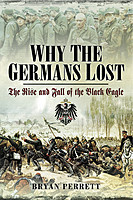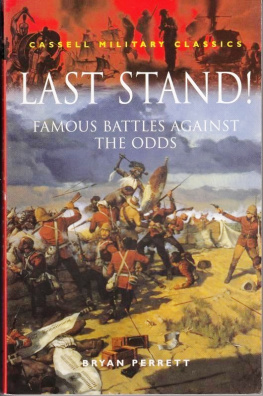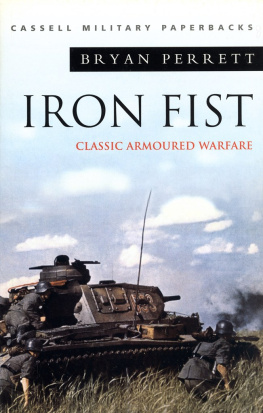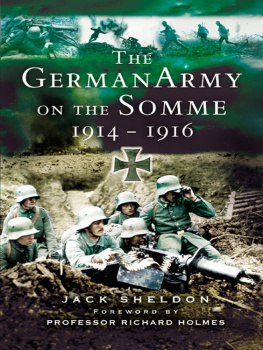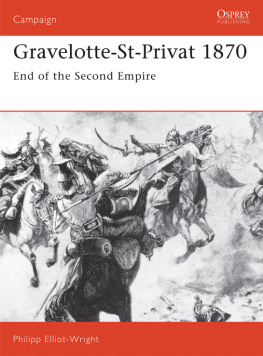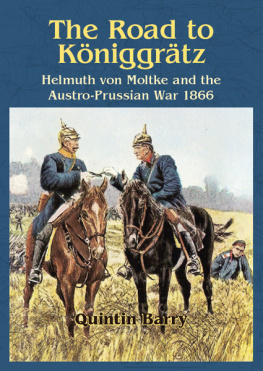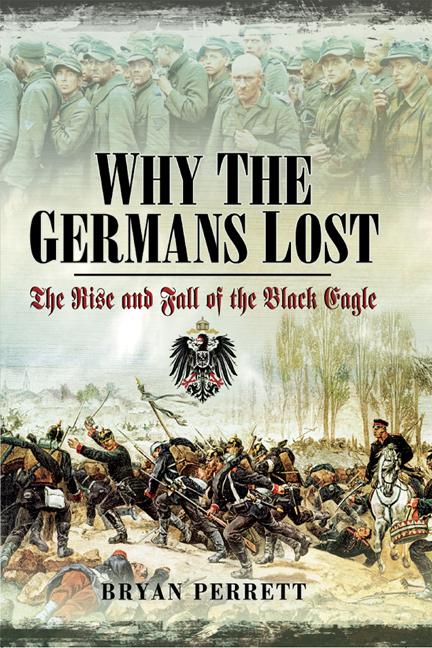
By the same author:
Lightning War: A History of Blitzkrieg, HarperCollins, London, 1985
Knights of the Black Cross: Hitlers Panzerwaffe and its Leaders, Robert Hale, London, 1986
The Czars British Squadron (with Anthony Lord), William Kimber, London, 1981
The Battle Book: Crucial Conflicts in History, 1469 BC to the Present, Brockhampton Press, Leicester, 2000
Published by Pen & Sword
North Sea Battleground: The War at Sea 191418, 2011
The Hunters and the Hunted: The Elimination of German Surface Warships around the World 191415, 2012
The Real Hornblower: The Life and Times of Admiral Sir James Gordon, 2013

First Published in Great Britain in 2013 by
PEN & SWORD MILITARY
an imprint of
Pen & Sword Books Ltd
47 Church Street, Barnsley, South Yorkshire S70 2AS
Copyright Bryan Perrett, 2013
ISBN 978-1-78159-197-0
eISBN 9781473831353
The right of Bryan Perrett to be identified as author of this work has been asserted by him in accordance with the Copyright, Designs and Patents Act 1988.
A CIP catalogue record for this book is available from the British Library.
All rights reserved. No part of this book may be reproduced or transmitted in any form or by any means, electronic or mechanical including photocopying, recording or by any information storage and retrieval system, without permission from the Publisher in writing.
Typeset in 11/13pt Palatino by
Concept, Huddersfield
Printed and bound in England by
CPI Group (UK) Ltd, Croydon, CRO 4YY
Pen & Sword Books Ltd incorporates the imprints of Pen & Sword Archaeology,
Atlas, Aviation, Battleground, Discovery, Family History, Fiction, History,
Maritime, Military, Naval, Politics, Railways, Select, Social History, Transport,
and True Crime, Frontline Books, Leo Cooper, Praetorian Press, Seaforth
Publishing and Wharncliffe.
For a complete list of Pen & Sword titles please contact
PEN & SWORD BOOKS LIMITED
47 Church Street, Barnsley, South Yorkshire, S70 2AS, England
E-mail: enquiries@pen-and-sword.co.uk
Website: www.pen-and-sword.co.uk
Contents
Chapter1 The Feldherr and His Army
Chapter2 Mistakes and Methods
Chapter3 The World Turned Upside Down
Chapter4 Picking Up The Pieces
Chapter5 Hollow Victory
Chapter6 Vorwarts!
Chapter7 Towards the Second Reich
Chapter8 Prussia Triumphant
Chapter9 Creating an Empire
Chapter10 Creating an Empire: 2
Chapter11 The Long Peace
Chapter12 A Choice of Foes
Chapter13 Imperial Endings
Chapter14 Land Ironclads and Storm Troopers
Chapter15 Poisoned Decades
Chapter16 The Blitzkrieg Years
Chapter17 Gotterdammerung
Bibliography
C HAPTER 1
The Feldherr and His Army
At the end of the seventeenth century the area of northern Europe known as Prussia was poor, backward, barren and of little or no interest to the powers of the day. One of the few ambitious families living within it were the Hohenzollerns, who were feudal lords of the small enclave of Brandenburg. By degrees, they expanded their holdings partly by purchase and partly by services undertaken for the Holy Roman Emperor, whose subjects included all of the German nobility. In due course, by adding force to his methods, the Elector of Brandenburg had won a major concession from the Emperor in that he was granted the right to call himself King of Prussia.
In 1713 the Prussian throne passed to Frederick William I, who was aged twenty-four. In character he was vigorous, energetic, determined, ruthless, violent and capable of inspiring great fear among his subjects. His ambition was to raise his countrys status to that of one of Europes great powers. To do that he recognised that he must acquire two things, namely wealth and military power. He promptly set about placing his national finances upon a sound footing and increased the strength of his small army to 89,000 officers and men. This he did by conscripting officers from his nobility and squirearchy and either impressing his own subjects or offering incentives to foreign recruits.
Training was thorough, drill was constant and discipline harsh. One means of punishment was the wooden horse, on which the defaulter was seated on its painfully thin back, consisting of three or four sloped planks each side, with heavy weights strapped to his legs. Even more painful was the pole, which had a spike on either side of its base or two rings near its top. The defaulter stood with his bare heels on the spikes and his wrists were pushed through the rings and fastened together. Granted that strict discipline was necessary given the nature of the battles fought, the sheer cruelty of this sort of punishment made the British Armys employment of flogging as the major corrective seem mild by comparison. Nevertheless, it was Frederick Williams intention that his soldiers should be more afraid of their officers than they were of the enemy. Drill and parades were his passion, to the extent that it was said, privately, of course, that he would have been just as happy if he had been born a drill sergeant. Certainly, he was as crude and foul-mouthed as the contemporary worst of the type.
However, even foreigners agreed that no infantry regiments in all of Europes armies could be considered to be as ready for war as Frederick Williams, with one notable exception. That was known by the rest of the Prussian Army as the Riesen Garde, or Giants Guard. It was a grenadier regiment in which all the men were well over six feet, and sometimes even seven feet, tall. The kings agents scoured Europe from Ireland to Russia for such men and were paid handsomely for the recruits they brought in. By no means all came voluntarily; more than a few had to be sandbagged and carted away unconscious and under guard, including at least one priest. The regiments running costs amounted to eight times that of a normal regiment. This might be surprising when one considers that the king was one of the meanest men alive, but it was his pride and joy and he fed its members better than he did the Hohenzollern princes. The problem was that it was utterly useless when it came to active service. Height apart, many of the men suffered severe ailments of the heart, other organs and the digestive system and were in generally poor health. Apart from giving drill demonstrations for distinguished visitors to the Prussian court, they would have been physically unable to stand the rigours of campaigning for more than a few days. When Frederick William died the regiment was reduced in size and those of its members who were released did their best to find their way home.
The king had fourteen children. He disliked thirteen of them but reserved a special hatred for Frederick, the fourth of them to arrive, and who would in due course become known to history as Frederick the Great. Brought up by a governess and tutor, both of whom were French, he developed a preference for French rather than German language and culture. He played the flute, enjoyed literature, studied art and took pleasure in civilised discussions. None of these things, in his fathers eyes, were masculine activities and they earned him frequent thrashings. His father also tried to strangle him with a length of cord, frequently had him whipped and occasionally expressed the wish that he was dead. Thrust into the Army at seventeen, Frederick decided to desert with a friend and escape abroad. The two were caught and imprisoned. The king forced Frederick to watch the execution of his friend and would have executed his son as well had it not been for intense pressure from the diplomatic corps.
Next page
